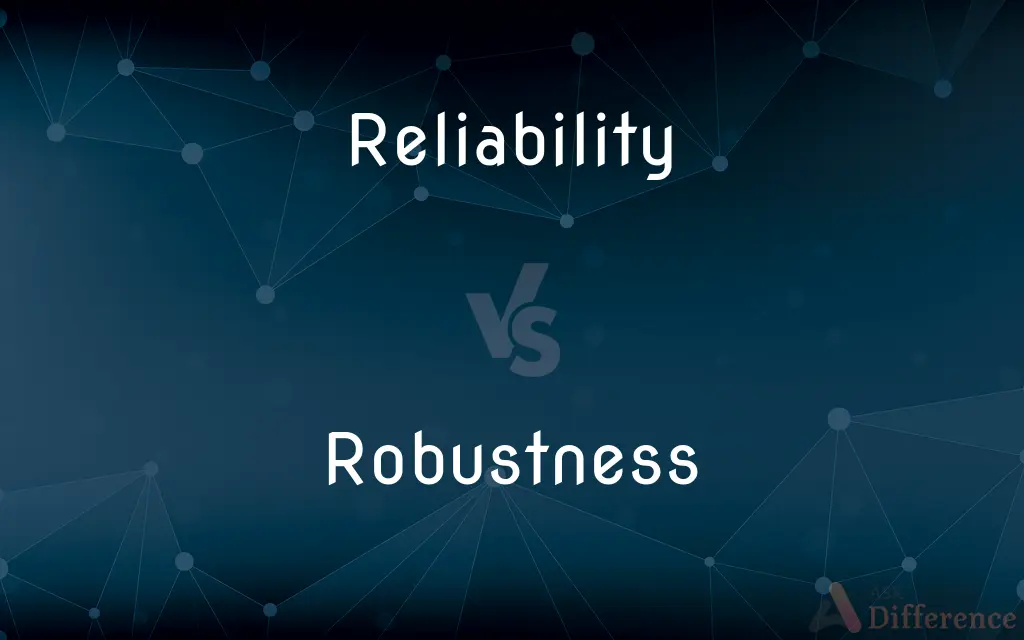Reliability vs. Robustness — What's the Difference?
By Maham Liaqat & Urooj Arif — Updated on April 3, 2024
Reliability refers to the consistency of a system's performance over time under expected conditions, while robustness measures a system's ability to function under varied or unexpected conditions without failing.

Difference Between Reliability and Robustness
Table of Contents
ADVERTISEMENT
Key Differences
Reliability in a system, device, or process means it can consistently perform its intended function under specified conditions for a designated period. It's about trustworthiness and dependability in expected scenarios. On the other hand, robustness refers to the ability of a system to handle errors, faults, or unexpected inputs without crashing or producing incorrect outcomes. It's about resilience and strength under pressure.
While reliability focuses on the system's performance under normal, expected conditions, robustness extends to the system's capacity to deal with unexpected conditions, stress, or external disturbances. Robust systems are designed to anticipate and cope with a range of operational challenges, whereas reliable systems are optimized for consistency in a defined environment.
In terms of measurement, reliability is often quantified through metrics like mean time between failures (MTBF) and failure rate during expected operational conditions. In contrast, robustness is evaluated based on a system's tolerance to various types of inputs, environmental factors, and stress tests beyond the normal operational scope.
Reliability is crucial in scenarios where consistent performance is key to fulfilling the system's purpose, such as in medical devices or financial systems. Robustness, however, is essential in environments where conditions can be unpredictable or where the system must handle a wide range of inputs, such as in automotive safety systems or software applications.
The focus on reliability ensures that a system or process meets its performance standards and user expectations without frequent failures. Meanwhile, a focus on robustness prepares a system to function effectively even in the face of challenges that were not specifically anticipated during its design phase, ensuring operational integrity under a broader set of conditions.
ADVERTISEMENT
Comparison Chart
Definition
Consistency of performance over time
Ability to operate under varied conditions
Focus
Performance under expected conditions
Handling of unexpected conditions
Measurement
Mean time between failures, failure rate
Tolerance to different inputs and environmental factors
Importance in
Medical devices, financial systems
Automotive systems, software applications
Key Quality
Dependability, trustworthiness
Resilience, strength
Evaluation Criteria
Performance standards, user expectations
Operational integrity in broad conditions
Compare with Definitions
Reliability
The ability of a system to perform consistently under specified conditions.
A reliable car starts every morning without fail.
Robustness
The capacity of a system to remain effective under a variety of conditions.
A robust communication system maintains connectivity in diverse environments.
Reliability
Dependability and predictability in performance.
Reliable software offers consistent output for the same input every time.
Robustness
Systems operating in unpredictable or harsh environments.
Military equipment is designed for robustness in combat conditions.
Reliability
Often quantified by metrics like failure rates and uptime percentages.
High reliability in a server is indicated by an uptime of 99.99%.
Robustness
Enhancing the system’s capacity to handle unexpected situations.
Adding error handling and fallback mechanisms increases software robustness.
Reliability
Systems where consistent performance is critical, like safety equipment.
Fire extinguishers must be reliable to function in case of an emergency.
Robustness
Evaluated through stress testing and exposure to extreme conditions.
Testing software robustness by simulating high traffic and hacking attempts.
Reliability
Reducing the likelihood of failure during normal operations.
Regular maintenance schedules improve the reliability of industrial machinery.
Robustness
Resilience and flexibility in the face of challenges.
A robust economic plan withstands market fluctuations and unexpected downturns.
Reliability
Capable of being relied on; dependable
A reliable assistant.
A reliable car.
Robustness
Robustness is the property of being strong and healthy in constitution. When it is transposed into a system, it refers to the ability of tolerating perturbations that might affect the system’s functional body.
Reliability
Yielding the same or compatible results in different clinical experiments or statistical trials.
Robustness
Full of health and strength; vigorous.
Reliability
The quality of being reliable, dependable, or trustworthy.
Robustness
Powerfully built; sturdy
A robust body.
Reliability
(education) the ability to measure the same thing consistently (of a measurement indicating the degree to which the measure is consistent); that is, repeated measurements would give the same result (See also validity).
Robustness
Requiring or characterized by much strength or energy
A robust workout.
Reliability
(engineering) measurable time of work before failure
Robustness
Active or dynamic
A robust debate.
A robust economy.
Reliability
The state or quality of being reliable; reliableness.
Robustness
Working in an effective way; effective or productive
A robust search engine.
A robust hypothesis.
Reliability
The trait of being dependable or reliable
Robustness
Marked by richness and fullness; full-bodied
A robust wine.
Robustness
Substantial in amount
Robust gains in stock prices.
Robustness
Rough or crude; coarse
A robust tale.
Robustness
The quality of being robust.
Robustness
The quality or state of being robust.
Robustness
The property of strong in constitution
Common Curiosities
Can a system be reliable but not robust?
Yes, a system can perform consistently under normal conditions (reliable) but fail under stress or unexpected scenarios (not robust).
How do you measure the robustness of a system?
Through stress testing, evaluating performance under extreme or unexpected conditions.
What distinguishes reliability from robustness?
Reliability is about consistent performance under known conditions, whereas robustness is about functioning under a wide range of conditions.
Can improvements in robustness affect reliability?
Yes, enhancing a system’s robustness can also improve its reliability by broadening the conditions under which it can operate effectively.
Why is reliability critical in safety systems?
Because consistent performance is essential for ensuring safety in critical situations.
How does the environment affect a system’s robustness?
A system's robustness must account for environmental variables that could impact performance, ensuring it can handle such diversity.
Does robustness relate only to physical systems?
No, robustness applies to any system, including software, economic plans, and business strategies.
What role does testing play in ensuring robustness?
Testing under diverse conditions is essential to identify and mitigate potential failures in a robust system.
Can software be both highly reliable and robust?
Yes, with thorough testing and design considerations, software can achieve high levels of both qualities.
Is robustness more important than reliability?
Importance varies by context; robustness is crucial in unpredictable environments, while reliability is key where consistent performance is needed.
How do unexpected inputs affect a robust system?
A robust system is designed to handle unexpected inputs without failure, maintaining its functionality.
What is the significance of uptime in measuring reliability?
Uptime indicates the percentage of time a system is operational and available, reflecting its reliability.
How do design principles affect a system's robustness?
Design principles that anticipate variability and incorporate tolerance for unforeseen conditions can significantly enhance robustness.
What strategies can improve a system’s reliability?
Regular maintenance, quality control, and redundancy can enhance system reliability.
Can redundancy improve robustness?
Yes, incorporating redundancy can help a system remain operational under failure conditions, enhancing robustness.
Share Your Discovery

Previous Comparison
Lepidolite vs. Amethyst
Next Comparison
Eagle vs. RavenAuthor Spotlight
Written by
Maham LiaqatCo-written by
Urooj ArifUrooj is a skilled content writer at Ask Difference, known for her exceptional ability to simplify complex topics into engaging and informative content. With a passion for research and a flair for clear, concise writing, she consistently delivers articles that resonate with our diverse audience.
















































